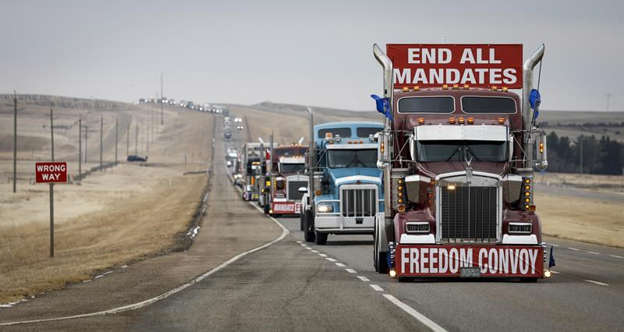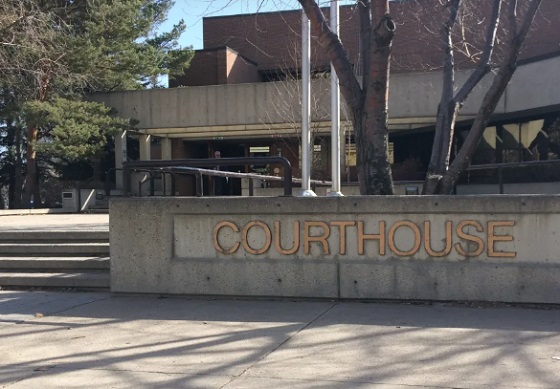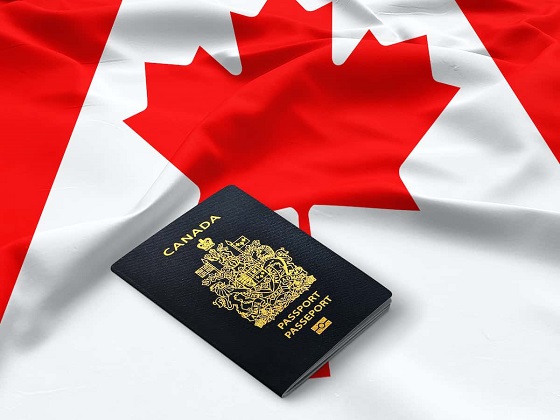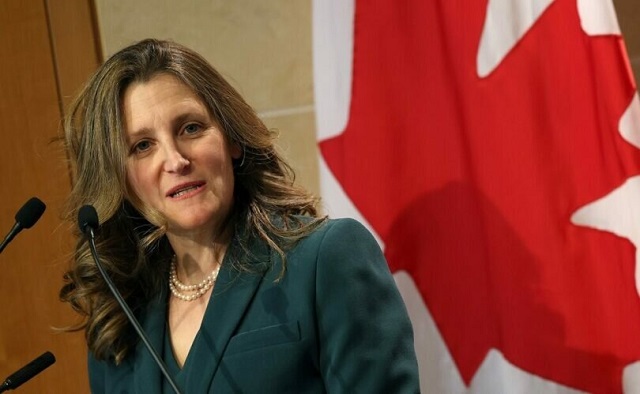Alberta
‘It could have been deadly’: Truckers end blockade at Alberta border crossing

COUTTS, Alta. — A blockade that paralyzed a United States border crossing for more than two weeks ended Tuesday as trucks and other vehicles with horns blaring rolled away from a southern Alberta community.
Protesters had been restricting access to the busy crossing near Coutts since Jan. 29 to rally against COVID-19 vaccine mandates for truckers and broader pandemic health restrictions.
Canada Border Services Agency said operations had resumed at the crossing and RCMP confirmed later Tuesday that traffic was moving smoothly.
The exodus of vehicles came one day after RCMP arrested 13 people and seized a cache of firearms and ammunition.
Charges laid include possession of weapons and mischief to property.
Four people also face a charge of conspiracy to murder RCMP members, said Chief Supt. Trevor Daroux. He said police worked closely with the Crown to ensure they had the necessary evidence to lay those charges.
Some of the accused were granted release in a Lethbridge, Alta., courtroom on Tuesday. A judge also ordered that they can’t contact one another or be within a 200-metre radius of any protest.
Mounties said an early-morning raid Monday uncovered 13 long guns, handguns, a machete, a large quantity of ammunition and body armour. Two additional weapons were seized later in the day.
RCMP also said a semi-truck and farm tractor had attempted to ram a police cruiser on Sunday.
“The dangerous criminal activity occurring away from the TV cameras and social media posts was real and organized,” said Deputy Commissioner Curtis Zablocki on Tuesday evening.
“It could have been deadly for citizens, protesters and officers.”
Daroux said the RCMP became aware of the heavily armed group a few days after the protest began. He said investigations are ongoing into this group and other events that took place during the blockade.
“Alberta RCMP will remain in the area until we are confident that the situation is safe and stabilized for all who travel through here,” he said.
Protesters are dissociating themselves from the group of people facing serious charges. Organizer Marco Van Huigenbos said that is why the convoy decided to leave peacefully.
He said he has no regrets about participating in the blockade.
“I think we’ve started a movement where people are going to get more involved … at the municipal level, provincial possibly, but also more involvement in politics in general.”
Two tactical vests seized by the RCMP had badges on them, which the Canadian Anti-Hate Network said have links to troubling movements.
One vest had a “Diagolon” patch on it, a white diagonal line across a black rectangle, that is linked to an often conspiratorial and antisemitic group, said Peter Smith from the network. He said the group often talks about a soon-approaching civil war.
“(Their) rhetoric is very violent,” said Smith. “One of the, kind of, common phrases used within the community is ‘A gun or rope?'”
The other patch said “Infidel” in both English and Arabic in yellow. Smith said the patch doesn’t indicate membership to a specific network but is known among Islamophobic militias and biker-style hate groups.
He said the biggest worry is having niche extremist networks that could work to inflame supporters linked to what was supposed to be a peaceful protest.
There was celebrating when the protest started winding down late Monday. A video posted to social media showed RCMP members shaking hands with and hugging protesters. People holding hats or hands to their chests or with arms draped across each other’s shoulders sang O Canada.
Cpl. Gina Slaney confirmed the scene was from Monday night in Coutts.Zablocki said RCMP is aware of the video.
“I will say, we do encourage our members to engage with the public and develop respectful, professional relationships with all Albertans,” said Zablocki. “We will be looking further into this matter.”
Jim Willett, mayor of the village of 250 people, said it had been a while since he had seen anything but semi-trailers on Highway 4.
“I can see all the way to Regina,” he said with a laugh.
Willett said he doesn’t blame the blockade leaders for the cache of weapons.
“They were a well-behaved bunch of people,” he said. “I think the organizers were taken aback as much as we were by what the RCMP discovered.”
The number of protesters at a police checkpoint, north of Coutts, had also dwindled and work was underway to start clearing away a first-aid trailer, a sauna and electric generators.
“Last night, emotions were high … I think a lot of people felt that we were giving up, but we’re not giving up,” said John Vanreeuwyk, a feedlot operator from Coaldale, Alta., also a protest organizer.
“Is it a victory? No. A victory means we’re done,” he said.
The blockade was one of several demonstrations in Canadian cities and border points that stalled trade, stranded travellers and disrupted lives of area residents, particularly in Ottawa.
Deputy Prime Minister Chrystia Freeland has said $48 million in trade was lost each day that the Coutts border was closed.
— With files from Alanna Smith in Calgary
This report by The Canadian Press was first published Feb. 15, 2022.
Bill Graveland, The Canadian Press
Alberta
Alberta threatens to fight Trudeau government restrictions on Canada’s plastics industry

From LifeSiteNews
“If the federal government refuses to abide by the constitution, we will take them to court again to defend our jurisdiction and the thousands of Albertans who work in the petrochemical sector”
Alberta has rejected the Liberal government’s “unconstitutional” federal plastics registry and production limit.
In an April 25 press release, Alberta’s Environment Minister Rebecca Schulz promised to take Liberal Minister of Environment and Climate Change Steven Guilbeault to court over his proposal to create a plastics registry, mandating companies to report their plastic production and implementation.
“If the federal government refuses to abide by the constitution, we will take them to court again to defend our jurisdiction and the thousands of Albertans who work in the petrochemical sector,” Schulz declared.
“This unilateral announcement is a slap in the face to Alberta and our province’s petrochemical industry, and the thousands of Albertans who work in it,” she continued.
Guilbeault’s plan, set to be implemented in September 2025, would mandate that businesses record how much plastic they place on the market in addition to the amount of plastic waste generated on their commercial, industrial, and institutional premises.
Companies would then report that amount to the federal government. The plan exempts small businesses which produce less than one tonne of plastic each year.
However, Schulz explained that the registry would negatively affect Alberta, as “plastics production is a growing part of Alberta’s economy, and we are positioned to lead the world for decades to come in the production of carbon neutral plastics.”
“Minister Guilbeault’s proposal would throw all of that into jeopardy and risk billions of dollars in investments. This includes projects like Dow Chemical’s net-zero petrochemical plant in Fort Saskatchewan, a $9-billion project that will create thousands of jobs,” she warned.
Schulz further pointed out that the mandate will not reduce plastic production since countries such as China will produce more plastic to make up for Canada.
“If the federal government limits plastic production in Canada, other countries like China will just produce more. The only outcome that this federal government will achieve will be fewer jobs in Canada,” she explained.
Schulz’s statement comes after the November decision by the Federal Court to rule in favor of Alberta and Saskatchewan, declaring that Prime Minister Justin Trudeau’s government overstepped its authority by classifying plastic as “toxic” and banning all single-use plastic items, like straws.
Essentially, the ruling overturned Trudeau’s 2022 law which outlawed manufacturing or importing plastic straws, cutlery, and checkout bags on the grounds of government claims that plastic was having a negative effect on the oceans. In reality, most plastic pollution in the oceans comes from a few countries, like India and China, which dump waste directly on beaches or in rivers.
The November ruling was only one of two recent court rulings that have dealt a blow to Trudeau’s environmental laws.
The second ruling came after Canada’s Supreme Court recently sided in favor of provincial autonomy when it comes to natural resources. The Supreme Court recently ruled that Trudeau’s law C-69, dubbed the “no-more pipelines” bill, is “mostly unconstitutional.” This was a huge win for Alberta and Saskatchewan, which challenged the law in court. The decision returned authority over the pipelines to provincial governments, meaning oil and gas projects headed up by the provinces should be allowed to proceed without federal intrusion.
The Trudeau government, however, seems insistent on defying the recent rulings by pushing forward with its various regulations.
Alberta
Red Deer Company fined $360,000.00 after 2022 workplace fatality

Company sentenced for workplace fatality
An oilfield equipment supplier will pay $360,000 related to a workplace fatality.
On Feb. 21, 2024 in the Red Deer Court of Justice, Isolation Equipment Services Inc. pleaded guilty to one charge under the Occupational Health and Safety (OHS) Code for failing to take measures to eliminate the potential danger of equipment or material that was dislodged or moved. The Crown withdrew 28 other charges under OHS legislation. The company was sentenced on April 24.
The charges stem from an incident on a Red Deer construction site on Jan. 13, 2022. A worker operating an overhead crane was positioning a valve bonnet when the equipment released from the rigging, striking and pinning the worker. The worker sustained fatal injuries.
The company will pay $360,000 in total penalties, including a $1,000 fine. Under a creative sentence, $359,000 will be paid to Energy Safety Canada to develop supervisor and competency programs targeting those who work with new, young and inexperienced workers.
The Occupational Health and Safety Act provides a creative sentence option in which funds that would otherwise be paid as fines are directed to an organization or project to improve or promote workplace health and safety.
Both the company and the Crown have up to 30 days to appeal the conviction or penalties.
Alberta’s OHS laws set basic health and safety rules for workplaces across the province. They provide guidance for employers to help them ensure their workplaces are as healthy and safe as possible while providing rights and protections for workers. Charges under OHS laws may be laid when failing to follow the rules results in a workplace fatality or serious injury.
Quick facts
- Jobs, Economy and Trade does not provide sentence documents. These are available through the Red Deer Court of Justice.
- Victim fine surcharges apply to fines payable to the Crown. The $1,000 fine in this case includes the 20 per cent surcharge. Surcharges are not applied to payments to other entities, in this case Energy Safety Canada, under creative sentences.
- Fatality investigation summaries are posted to alberta.ca/fatality-
investigation-reports 60 to 90 days after court proceedings conclude.
Related information
-

 Automotive2 days ago
Automotive2 days agoThe EV ‘Bloodbath’ Arrives Early
-

 Frontier Centre for Public Policy1 day ago
Frontier Centre for Public Policy1 day agoHow much do today’s immigrants help Canada?
-

 Fraser Institute7 hours ago
Fraser Institute7 hours agoFederal government’s fiscal record—one for the history books
-

 Alberta7 hours ago
Alberta7 hours agoPrincipal at Calgary Elementary School charged with possession of child pornography
-

 Bruce Dowbiggin7 hours ago
Bruce Dowbiggin7 hours agoIn Toronto The Leafs Always Fall In Spring: 2024 Edition
-

 Alberta7 hours ago
Alberta7 hours agoRed Deer Company fined $360,000.00 after 2022 workplace fatality
-

 Alberta2 hours ago
Alberta2 hours agoAlberta threatens to fight Trudeau government restrictions on Canada’s plastics industry
-

 CBDC Central Bank Digital Currency1 day ago
CBDC Central Bank Digital Currency1 day agoA Fed-Controlled Digital Dollar Could Mean The End Of Freedom








